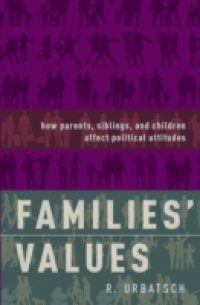One of the central questions in politics is from where people derive their tastes and opinions. Why do some people embrace the free market, while others prefer an interventionist state? From where do preferences for a vigorous foreign policy or for sterner policing of moral issues come? As has been shown, political preferences may be influenced by perceived benefits, the media, or public intellectuals, but less is known about the influence of family on political attitudes. Some mechanisms of family influence are well-known: people tend to share their parents political philosophies, while those with young children have heightened concern for child-related policies such as education. But family dynamics are likely to have far richer and more varied effects on political attitudes than those traditionally considered. Families Values considers the ways that the everyday behaviors of family members systematically and unconsciously influence political preferences. For example, does having a mother who works outside the home lead children, when grown-up, to have more liberal ideologies? Or, might having a son who could potentially be drafted into the armed forces influence a parent to become a pacifist? Drawing on surveys from the United States and the United Kingdom, R. Urbatsch looks at the ways in which parents, siblings, birth order, gender, and socioeconomics influence opinions on issues from war, to the welfare state, to abortion. Through compelling analysis, he demonstrates that our family relationships play an enormously crucial and multi-faceted role in the way that we experience, learn about, and practice politics.

